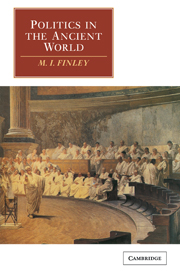1 - State, class and power
Published online by Cambridge University Press: 05 June 2012
Summary
In the third book of the Politics (1279b6–40) Aristotle wrote: ‘Tyranny is the rule of one man to the advantage of the ruler, oligarchy to the advantage of the rich, democracy to the advantage of the poor’. He then went on to gloss this definition: ‘whether the few or the many rule is accidental to oligarchy and democracy – the rich are few everywhere, the poor many … The real difference between democracy and oligarchy is poverty and wealth.’
Late in the nineteenth century, in his great commentary on the Politics, W. L. Newman observed that Aristotle was here giving ‘explicit recognition to an important truth’, for the prevailing modern social-contract theory of the state ‘obscures our recognition of the fact which Aristotle had long ago pointed out, that the constitution of a State has its roots in what moderns term its social system’. More precisely, Aristotle gave systematic formulation to a common but still rather loose notion that was widely (perhaps universally) shared by the classical Greeks. It pervades their literature, among poets, historians and pamphleteers as well as political philosophers – from Hesiod's bitter complaint against the ‘gift devouring’ princes and their crooked judgments, through the reformer Solon's boast, ‘I stood covering both [rich and poor] with a strong shield, permitting neither to triumph unjustly over the other’, to Plato's lengthy insistence that even before the degenerate present, the great Athenian leaders of the good old days, Miltiades, Themistocles, Cimon and Pericles, were no better than pastry cooks, stuffing the common people (demos) with material goods.
- Type
- Chapter
- Information
- Politics in the Ancient World , pp. 1 - 23Publisher: Cambridge University PressPrint publication year: 1983

